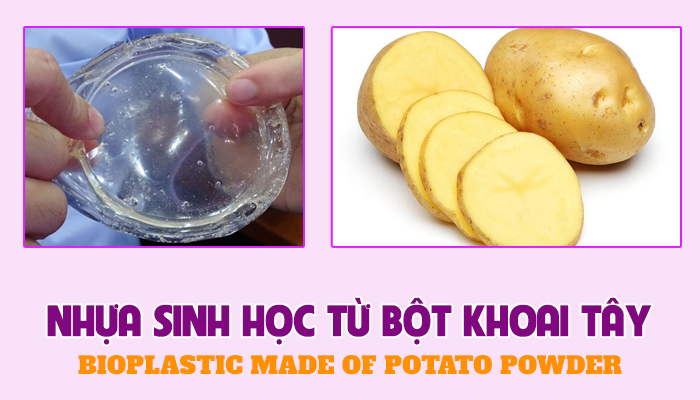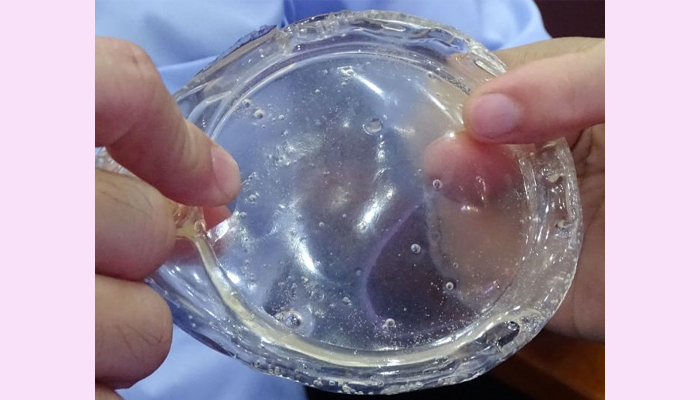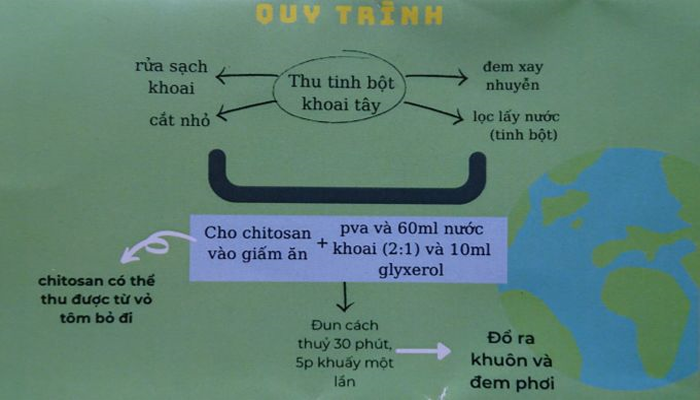
BIOPLASTIC MADE OF POTATO POWDER
A group of students at Bui Thi Xuan High School, District 1 HCM City has created bioplastic with high elasticity, hard to break, and suitable for making household utensils from potatoes.
GRAPHENE: THE SUPER MATERIAL FORMULATED FROM PLASTIC
COOLING PAINT
PLASTIC FOAM RECYCLING
FLEXIBLE GLASSES - INSPIRATION FROM SEASHELLS
BIOPLASTIC MADE OF POTATO POWDER
A group of students at Bui Thi Xuan High School, District 1 HCM City has created bioplastic with high elasticity, hard to break, and suitable for making household utensils from potatoes.
The product was researched for 6 months by Pham Thanh Hanh Thu, Tong Dang Khanh Vinh (grade 12), and Vo Ngoc Thuy Dung (grade 10) with the aim of creating a plastic with high durability but easy to decompose when buried. The product aims to reduce the use of single-use plastic bags and plastic bags that pollute the environment.
Hanh Thu said that during the period of Ho Chi Minh City's social distancing in the middle of last year, many vegetables, including potatoes, were used as food to be stored for a long time and had to be discarded. Realizing that potatoes have the ability to create a good adhesive film, Thu and team members found ways to make use of bioplastics.
Starting the research, the team discovered that the properties of potato starch were less stable, so the team mixed chitosan taken from shrimp shells and Polyvinyl alcohol (PVA) to increase the durability of the product. "Spoiled potatoes and shells of shrimp and crabs are available and discarded materials, so they are very suitable for bioplastic production, bringing a green living trend to people," Thu said.

Bioplastic finished product of the group.
To make the bioplastic, the team collected germinated potatoes, washed and chopped them in a blender, and then continued to filter with a cloth to get a solution containing starch. This starch is mixed with PVA, glycerol, chitosan, and vinegar, then boiled in water for 30 minutes and molded, and dried for 2-3 days to produce bioplastic. The product has good elasticity, difficult to stretch, and difficult to break.
From this result, the group shapes plastic into household items such as coasters, phone cases, school supplies, etc. The product has high durability and does not mold or decompose during use for many months.
Khanh Vinh said that bioplastic product have a decomposition time of more than two months after being buried with abundant watering conditions. If watering less, the plastic decomposes longer, after 3-4 months. "Many types of plastic have a very long decomposition time (up to a hundred years or longer), so the group's products can be used in the household in an environmentally friendly way," Vinh said.
The process of creating bioplastics is easy to do, the team wants to spread this knowledge to many families to make plastic products that are both usable and environmentally friendly and help children gain more scientific knowledge through practical experiences.

The group's bioplastic manufacturing process.
Dr. Do Viet Ha, a food chemist and former deputy of the Management Board of the High-Tech Agricultural Park in Ho Chi Minh City, said that the group's research is not new, but with the ability of high school students, the results are very encouraging.
According to Mr. Ha, currently there is research to make rice straws without using additives. While the research direction of the group using chitosan additives is quite expensive at high concentrations. In addition, the group using PVA partly affects the environment because when broken, it forms microplastics in the soil.
"The group needs to think in a more optimal research direction, using some other starches such as rice, flour ...", Dr. Ha said, and he also said that the durability of bioplastics also needs to measure the physical and mechanical properties of the material to accurately determine through the index.
>> Click HERE to read our UPDATED NEWS<<
Contact
MEGA VIETNAM
Office address: Floor 2-A2-IA20, Nam Thang Long Urban Area, Pham Van Dong Street,
Dong Ngac Ward, Bac Tu Liem District, Hanoi City, Vietnam
Email: contact@megavietnam.vn
Tel: (+84) 24 375 89089; Fax: (+84) 24 375 89 098
Website: megavietnam.vn
Hotline: 1800.577.728 Zalo: 0971.023.523





